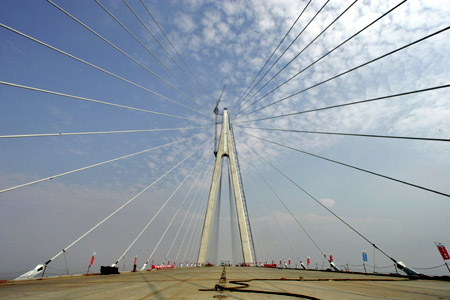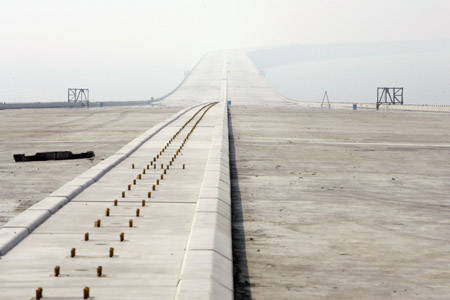Chinese city Ningbo builds bridge to prosperity
(Reuters)Updated: 2007-07-09 10:19
NINGBO, China - The $1.5 billion, S-shaped bridge that will link Ningbo and Shanghai is graceful testimony to the huge sums that China is investing in infrastructure to keep raising the potential of the world's fourth-largest economy.
By cutting the transit time between the two port cities to 2 hours from four, the 36 km (22.5 mile) sea bridge, the world's longest, will give a further boost to one of the most prosperous corners of China when it opens next June, businessmen and officials say.
"Construction of the bridge will accelerate the flow of goods and talent and give a push to the integration of economic development in the Yangtze River Delta," said Lu Zheng, who directs the Institute of Industrial Economics at the Chinese Academy of Social Sciences in Beijing.
 Hangzhou Bay Bridge is seen on its inauguration near Cixi, east China's Zhejiang Province in this file photo taken June 26, 2007. [Reuters] |
All across China, extensive investments in the sinews of the economy are transforming the prospects of second-tier cities like Ningbo. Spending on fixed assets like airports and power plants has grown steadily at around 25 percent annually in recent years.
Just a week before the Hangzhou Bay bridge was finished on June 26, workers completed the Sutong bridge over the Yangtze river, less than 300 km away.
That $845 million bridge also set a record: its 1,088 metre span makes it the world's longest cable-stayed bridge.
Although sceptics fear many of the projects will turn out to be white elephants, China's planners are convinced that first-class roads and ports are key to increasing productive capacity and enabling businesses to march up the value chain.
China plans to spend $205 billion on its railways alone between 2006 and 2010.
To Get Rich, Build Roads
 The Hangzhou Bay Bridge is seen near Cixi, east China's Zhejiang Province in this file photo taken June 26, 2007. [Reuters] |
Like any number of Chinese cities, Ningbo has taken to heart the old Chinese saying "If you want to be rich, you must first build roads". It plans to spend more than 30 billion yuan ($4 billion) between 2006 and 2010 on railways, highways and bridges.
"The bridge will make my travel to Shanghai shorter and cheaper," said Ralph Fohr, managing director of a German consulting firm, as he was packing to fly back to Shanghai after attending a trade fair in Ningbo.
"Time is something that I can't buy," said Fohr, who makes the trip to Ningbo once a week. It normally takes him 3-4 hours, door to door.
Ningbo sits in the industrial heartlands of eastern Zhejiang province, a hotbed of private enterprise.
A city of 5.5 million, it is home to a swarm of manufacturers including well-known Chinese names such as Ningbo Bird, a mobile phone maker, and Younger, a garment producer.
Shorter travelling times will make it easier for manufacturers to team up with design professionals in Shanghai, said Lu, the CASS researcher.
"That will definitely help Ningbo upgrade its manufacturing industry since Shanghai is now increasingly becoming a design hub in addition to its role as China's financial and research and development centre," he said.
An important port for more than 1,000 years, Ningbo's economy grew 13.4
percent in 2006. That took the city's per capita output to $6,568, more than
three times the national average and close to Shanghai's $7,490. Property prices
are rising fast.
| 1 | 2 |  |
|
||
|
||
|
|